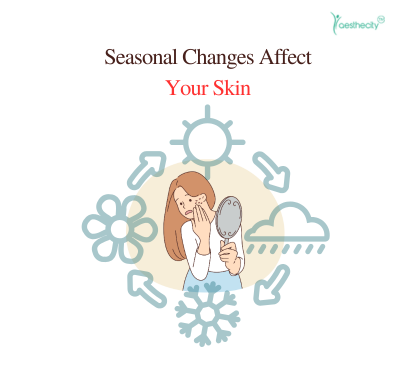Your skin is the largest organ of your body and acts as a protective barrier against external elements. However, as seasons change, so do the environmental conditions that affect your skin’s health. From dry winters to humid summers, each season presents unique challenges that can lead to dryness, breakouts, sensitivity, and premature aging if not properly managed.
Understanding how seasonal changes impact your skin allows you to adjust your skincare routine and keep your skin healthy throughout the year. In this blog, we will discuss:
✅ How each season affects your skin
✅ Common skin concerns in different seasons
✅ Effective skincare tips to protect your skin year-round
Let’s dive in!
How Different Seasons Affect Your Skin
1. Winter (Cold and Dry Weather)
How Winter Affects the Skin:
✔ Low humidity levels cause dry, flaky, and itchy skin.
✔ Harsh winds can lead to cracked, irritated, or chapped skin.
✔ Indoor heating removes moisture from the skin, making it feel tight.
✔ Hot showers strip away natural oils, increasing skin dryness.
Common Skin Problems in Winter:
❄ Dry and rough skin
❄ Flaky patches and redness
❄ Chapped lips and cracked heels
❄ Increased sensitivity and itchiness
Winter Skincare Tips:
✔ Use a hydrating cleanser to prevent excessive dryness.
✔ Apply a thick moisturizer with ceramides and hyaluronic acid.
✔ Use lip balm to prevent cracked lips.
✔ Avoid long, hot showers; opt for lukewarm water instead.
✔ Install a humidifier to maintain indoor moisture levels.
✔ Wear gloves and scarves to protect your skin from cold air.
2. Summer (Hot and Humid Weather)
How Summer Affects the Skin:
✔ Excess heat causes excessive sweating, leading to clogged pores.
✔ High humidity increases oil production, triggering acne breakouts.
✔ Sun exposure increases the risk of tanning, sunburn, and premature aging.
✔ Dehydration causes dull and lifeless skin.
Common Skin Problems in Summer:
☀ Oily skin and acne breakouts
☀ Sunburn, tanning, and hyperpigmentation
☀ Heat rashes and prickly heat
☀ Dehydrated and tired-looking skin
Summer Skincare Tips:
✔ Use a lightweight, oil-free sunscreen (SPF 30 or higher).
✔ Switch to gel-based or water-based moisturizers.
✔ Wash your face twice daily to remove excess oil and dirt.
✔ Stay hydrated by drinking 8-10 glasses of water daily.
✔ Exfoliate gently once a week to remove dead skin cells.
✔ Wear cotton clothing to allow the skin to breathe.
3. Monsoon (Rainy and Humid Weather)
How Monsoon Affects the Skin:
✔ Increased humidity leads to excess oil and bacterial growth.
✔ Damp weather clogs pores, causing acne and fungal infections.
✔ Skin may feel greasy, sticky, and irritated.
✔ Excess moisture leads to fungal infections on the feet and body.
Common Skin Problems in Monsoon:
🌧 Acne, pimples, and breakouts
🌧 Skin allergies and fungal infections
🌧 Oily skin and open pores
🌧 Body odor due to excessive sweating
Monsoon Skincare Tips:
✔ Use mild, antibacterial face wash to prevent breakouts.
✔ Apply oil-free, mattifying sunscreen even on cloudy days.
✔ Keep the skin dry and avoid excessive sweating.
✔ Use anti-fungal powder to prevent infections.
✔ Wear breathable fabrics to avoid moisture buildup.
✔ Avoid touching your face frequently to prevent bacterial transfer.
4. Autumn (Transition Season – Moderate Weather)
How Autumn Affects the Skin:
✔ Transition from humid to dry air leads to imbalanced skin.
✔ Skin can become dull and rough due to temperature fluctuations.
✔ A drop in temperature reduces moisture retention, leading to dryness.
Common Skin Problems in Autumn:
🍂 Dull, lifeless skin
🍂 Dry and rough patches
🍂 Increased sensitivity and redness
Autumn Skincare Tips:
✔ Use a mild exfoliator to remove dead skin cells.
✔ Switch to a hydrating serum with vitamin C to maintain glow.
✔ Apply a rich moisturizer to lock in hydration.
✔ Keep lips moisturized with a nourishing lip balm.
✔ Prepare your skin for winter by using hydrating masks.
Essential Skincare Tips for Every Season
1. Stay Hydrated
✔ Drink enough water daily to maintain skin moisture.
✔ Eat water-rich foods like watermelon, cucumber, and oranges.
2. Use Sunscreen Year-Round
✔ Apply sunscreen even on cloudy or cold days.
✔ Choose an SPF 30 or higher with UVA & UVB protection.
3. Adjust Your Moisturizer
✔ Use lightweight gel moisturizers in summer.
✔ Opt for rich, hydrating creams in winter.
4. Cleanse Gently
✔ Avoid harsh cleansers that strip the skin’s natural oils.
✔ Choose pH-balanced face washes suited to your skin type.
5. Eat a Skin-Friendly Diet
✔ Consume antioxidant-rich foods like berries, nuts, and green leafy vegetables.
✔ Reduce sugar and processed foods to prevent breakouts.
6. Follow a Proper Night Skincare Routine
✔ Apply serums, night creams, and eye creams to repair skin overnight.
✔ Get 7-8 hours of sleep for better skin regeneration.
7. Exfoliate Wisely
✔ Exfoliate 1-2 times a week to remove dead skin cells.
✔ Avoid over-exfoliation as it can cause irritation and sensitivity.
Each season brings different challenges for your skin, and adapting your skincare routine is key to maintaining healthy, glowing skin year-round. By understanding how weather changes impact your skin and following the right skincare routine, you can prevent common seasonal skin issues like dryness, acne, sun damage, and irritation.
No matter the season, staying hydrated, using sunscreen, and choosing the right skincare products will help keep your skin protected and nourished.
FAQs
1. How does winter affect oily skin?
✔ Even oily skin can become dehydrated in winter, leading to excess oil production.
✔ Use a lightweight, non-greasy moisturizer to balance hydration.
2. Can I skip sunscreen on cloudy days?
✔ No! UV rays penetrate clouds and cause skin damage and pigmentation.
✔ Always wear broad-spectrum SPF sunscreen regardless of the season.
3. How can I prevent acne breakouts in summer?
✔ Use oil-free, lightweight products and wash your face twice daily.
✔ Keep skin clean and dry to avoid clogged pores and bacterial growth.

